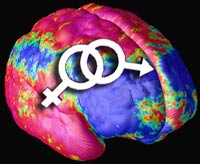
I'm not sure if this book that the Washington Post reports on is really a thoughtful discourse or just adding fuel to the gender stereotype fires -- the article in the Post suggests the latter:
According to pop psychiatrist Louann Brizendine, author of the best-selling new book "The Female Brain," men and women come equipped with completely different operating systems -- not only below the belt but between the ears.
Like bath towels, there are his-and-her brains -- that there is no such thing as 'unisex brain.'
Brizendine insists this is a scientific fact. Males and females may perform similar calculations, but they use different "circuits." Woman is Mac. Man is PC. Blame the brain.
For Brizendine, it's all about the hormones --"The female brain is so affected by hormones, they control her very perception of reality," says the doctor. "Her values, her desires, what's important to her, even whom she loves." For him, brain awash in testosterone, it's all about sex and aggression...
But some of her critics say that what Brizendine did was overstate the science. In part, it may be the style that Brizendine adopts when she speaks and writes. When science looks for differences, it finds them in the average male and average female -- meaning that if six in 10 women show an advantage in one area, so do four in 10 men. But this gets lost
in the prose.
n a 2001 National Academy of Sciences report, the authors write: "Sex matters. Sex, that is, being male or female, is an important basic human variable that should be considered when designing and analyzing studies in all areas and at all levels of biomedical and health-related research."
I'd like to get Martha Farah's or Judy Illes's take on this supposed scientific research, two women who have been among the founders of The Neuroethics Society, a brand new interdisciplinary group of scholars, scientists and clinicians who share an interest in the social, legal, ethical and policy implications of advances in neuroscience.








No comments:
Post a Comment